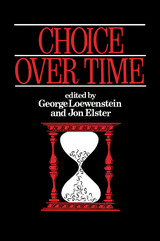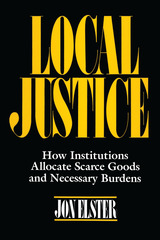5 books about Elster, Jon

Addiction
Entries and Exits
Jon Elster
Russell Sage Foundation, 1999
Addiction focuses on the emergence, nature, and persistence of addictive behavior, as well as the efforts of addicts to overcome their condition. Do addicts act of their own free will, or are they driven by forces beyond their control? Do structured treatment programs offer more hope for recovery? What causes relapses to occur? Recent scholarship has focused attention on the voluntary aspects of addiction, particularly the role played by choice. Addiction draws upon this new research and the investigations of economists, psychiatrists, philosophers, neuropharmacologists, historians, and sociologists to offer an important new approach to our understanding of addictive behavior. The notion that addicts favor present rewards over future gains or penalties echoes throughout the chapters in Addiction. The effect of cultural values and beliefs on addicts, and on those who treat them, is also explored, particularly in chapters by Elster on alcoholism and by Acker on American heroin addicts in the 1920s and 1930s. Essays by Gardner and by Waal and Mørland discuss the neurobiological roots of addiction Among their findings are evidence that addictive drugs also have an important effect on areas of the central nervous system unrelated to euphoria or dysphoria, and that tolerance and withdrawal phenomena vary greatly from drug to drug. The plight of addicts struggling to regain control of their lives receives important consideration in Addiction. Elster, Skog, and O'Donoghue and Rabin look at self-administered therapies ranging from behavioral modifications to cognitive techniques, and discuss conditions under which various treatment strategies work. Drug-based forms of treatment are discussed by Gardner, drawing on work that suggests that parts of the population have low levels of dopamine, inducing a tendency toward sensation-seeking. There are many different explanations for the impulsive, self-destructive behavior that is addiction. By bringing the triple perspective of neurobiology, choice, and culture to bear on the phenomenon, Addiction offers a unique and valuable source of information and debate on a problem of world-wide proportions.
[more]

Choice Over Time
George Loewenstein
Russell Sage Foundation, 1992
Many of our most urgent national problems suggest a widespread lack of concern for the future. Alarming economic conditions, such as low national savings rates, declining corporate investment in long-term capital projects, and ballooning private and public debt are matched by such social ills as diminished educational achievement, environmental degradation, and high rates of infant mortality, crime, and teenage pregnancy. At the heart of all these troubles lies an important behavioral phenomenon: in the role of consumer, manager, voter, student, or parent, many Americans choose inferior but immediate rewards over greater long-term benefits. Choice Over Time offers a rich sampling of original research on intertemporal choice—how and why people decide between immediate and delayed consequences—from a broad range of theoretical and methodological perspectives in philosophy, political science, psychology, and economics. George Loewenstein, Jon Elster, and their distinguished colleagues review existing theories and forge new approaches to understanding significant questions: Why do people seem to "discount" future benefits? Do individuals use the same decision-making strategy in all aspects of their lives? What part is played by situational factors such as the certainty of delayed consequences? How are decisions affected by personal factors such as willpower and taste? In addressing these issues, the contributors to Choice Over Time address many social, economic, psychological, and personal time problems. Their work demonstrates the predictive power of short-term preferences in behavior as varied as addiction and phobia, the effect of prices on consumption, and the dramatic rise in debt and decline in savings. Choice Over Time provides an essential source for the most recent research and theory on intertemporal choice, offering new models for time preference patterns—and their aberrations—and presenting a diversity of potential solutions to the problem of "temporal myopia."
[more]

Local Justice
How Institutions Allocate Scarce Goods and Necessary Burdens
Jon Elster
Russell Sage Foundation, 1992
The well-being of individuals routinely depends on their success in obtaining goods and avoiding burdens distributed by society. Local Justice offers the first systematic analysis of the principles and procedures used in dispensing "local justice" in situations as varied as the admission of students to college, the choice of patients for organ transplants, the selection of workers for layoffs, and the induction of men into the army. A prominent theorist in the field of rational choice and decision making, Jon Elster develops a rich selection of empirical examples and case studies to demonstrate the diversity of procedures used by institutions that mete out local justice. From this revealing material Elster fashions a conceptual framework for understanding why institutions make these crucial allocations in the ways they do. Elster's investigation discloses the many complex and varied approaches of such decision-making bodies as selective service and adoption agencies, employers and universities, prison and immigration authorities. What are the conflicting demands placed on these institutions by the needs of applicants, the recommendations of external agencies, and their own organizational imperatives? Often, as Elster shows, methods of allocation may actually aggravate social problems. For instance, the likelihood that handicapped or minority infants will be adopted is further decreased when agencies apply the same stringent screening criteria—exclusion of people over forty, single parents, working wives, and low-income families—that they use for more sought-after babies. Elster proposes a classification of the main principles and procedures used to match goods with individuals, charts the interactions among these mechanisms of local justice, and evaluates them in terms of fairness and efficiency. From his empirical groundwork, Elster builds an innovative analysis of the historical processes by which, at given times and under given circumstances, preferences become principles and principles become procedures. Local Justice concludes with a comparison of local justice systems with major contemporary theories of social justice—utilitarianism, John Rawls's A Theory of Justice, Robert Nozick's Anarchy, State, and Utopia—and discusses the "common-sense conception of justice" held by professional decision makers such as lawyers, economists, and politicians. The difference between what we say about justice and how we actually dispense it is the illuminating principle behind Elster's book. A perceptive and cosmopolitan study, Local Justice is a seminal work for all those concerned with the formation of ethical policy and social welfare—philosophers, economists, political scientists, health care professionals, policy makers, and educators.
[more]

Local Justice in America
Jon Elster
Russell Sage Foundation, 1995
Notions of justice and fairness are central to the American belief that the pursuit of a healthy and productive life is the right of all citizens. Yet in the real world there are seldom sufficient resources to meet the needs of everyone, and institutions are routinely forced to make difficult decisions regarding who will be favored and who will not. Local Justice in America is an insightful look into how selections are made in four critical areas: college admissions, kidney transplants, employee layoffs, and legalized immigration. This volume's case studies survey the history and modern rationale behind seemingly enigmatic allocation systems, chronicling the political and ethical debates, occasional scandals, and judicial battles that have shaped them. Though these selection processes differ significantly, each reflects a bitter struggle between opposing—and equally intense—principles of local justice. For example, are admissions officers who use special points to foster student diversity less fair than those who rely exclusively on scholastic achievement? How did the system of personal discretion among doctors selecting transplant patients come to be viewed by the public as more inequitable than compassionate? Does the use of seniority as a gauge in layoffs violate equal opportunity laws or provide employers with their only objective and neutral criterion? How have partisan interest groups repeatedly shifted immigration quotas between the extremes of xenophobia and altruism? In framing chapters, editor Jon Elster draws upon these studies to speculate on the unique nature of the American value system. Arguing that race matters deeply in all considerations of local justice, he discusses how our society's assessment of neediness balances on the often uneasy compromises between the desire to reward deserving individuals and the call to strengthen opportunities for disadvantaged groups. Well informed and stimulating, Local Justice in America speaks directly to policy debates in the fields of health, education, work, and immigration, and makes an important contribution to our understanding of the fundamental social issues that affect our daily welfare.
[more]

The Roundtable Talks and the Breakdown of Communism
Edited by Jon Elster
University of Chicago Press, 1996
In 1989 and 1990, Eastern European Communist regimes and opposition groups conducted a series of roundtable talks to peacefully negotiate the abolition of authoritarian rule and the transition to democratic governance. This volume documents that unprecedented process of national reinvention and constitution making.
These essays capture the historical circumstances of these countries—their traditions, customs, and the balance of influence between competing factions—that often took precedence over constitutional ideals. In five country-specific reports, senior scholars provide detailed accounts of the talks in Bulgaria, Poland, Hungary, Czechoslovakia, and the German Democratic Republic. Also included is an essay on the political factors underlying the failure of negotiations between reform groups and the Chinese regime, providing an illuminating counterpoint to the path taken in Eastern Europe.
This book is an invaluable resource for scholars of constitutional design and democratization and for specialists in Eastern Europe.
These essays capture the historical circumstances of these countries—their traditions, customs, and the balance of influence between competing factions—that often took precedence over constitutional ideals. In five country-specific reports, senior scholars provide detailed accounts of the talks in Bulgaria, Poland, Hungary, Czechoslovakia, and the German Democratic Republic. Also included is an essay on the political factors underlying the failure of negotiations between reform groups and the Chinese regime, providing an illuminating counterpoint to the path taken in Eastern Europe.
This book is an invaluable resource for scholars of constitutional design and democratization and for specialists in Eastern Europe.
[more]
READERS
Browse our collection.
PUBLISHERS
See BiblioVault's publisher services.
STUDENT SERVICES
Files for college accessibility offices.
UChicago Accessibility Resources
home | accessibility | search | about | contact us
BiblioVault ® 2001 - 2024
The University of Chicago Press









